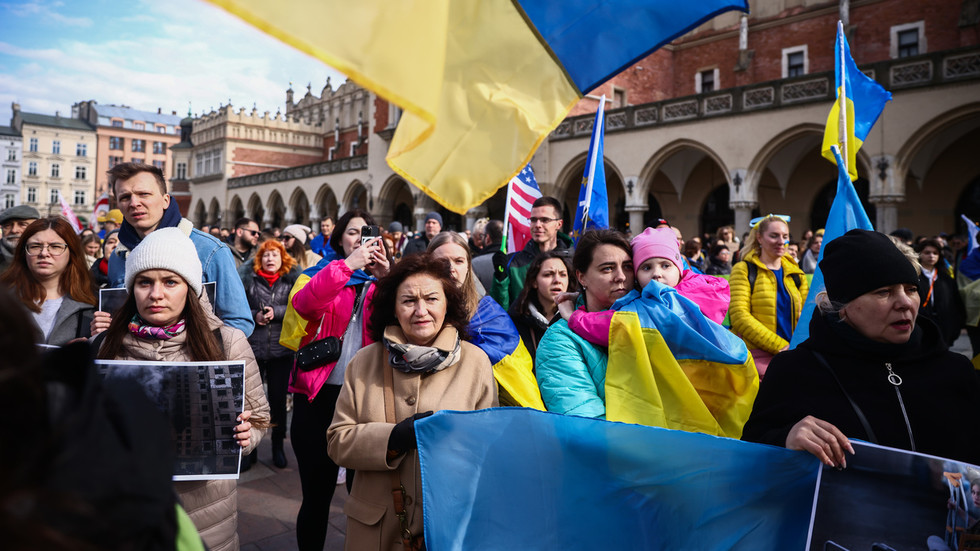The sentiment towards refugees from Ukraine has taken a dramatic turn among Polish citizens, as highlighted by a recent poll conducted by the Center for Public Opinion Research (CBOS). The survey, published by PAP news agency, reveals that two-thirds of the Polish population now supports the idea of sending male Ukrainian refugees of military age back to Ukraine to engage in the ongoing conflict against Russia. Specifically, the poll indicates that 67% of Poles favor this measure, while only 22% believe these refugees should be allowed to remain in Poland. This marked shift in attitude is underscored by a broader decline in support for Ukrainian refugees, as more than half (53%) of respondents still advocate for Poland’s continued acceptance of Ukrainian refugees, although this figure represents the lowest level of support since the beginning of the conflict in March 2022, when it stood at a striking 94%.
This evolution in public opinion reflects the increasing frustrations and challenges faced by Poland as a host country for Ukrainian refugees. Since the onset of the war, Poland has opened its borders to over a million Ukrainians seeking safety and stability in the face of war. However, as the conflict enters a protracted phase, a palpable shift in the populace’s sentiment has begun to surface. The poll, which engaged 941 respondents between September 12 and September 22 through a mixture of telephone, online, and in-person interviews, demonstrates that the earlier wave of unqualified support has begun to wane. The current figures shed light on a complex balancing act for Poland, which has strived to act as a bastion of support for Ukraine while grappling with its own capacity to integrate and sustain such a large influx of refugees.
Compounding these attitudes are political voices from within Poland’s leadership. Polish Foreign Minister Radoslaw Sikorski recently proposed reducing social benefits afforded to Ukrainian refugees, arguing that it would prompt them to return home instead of relying on Polish resources. This rhetoric indicates a growing concern that ongoing support for refugees could inadvertently facilitate draft evasion among military-age men, which the Minister strongly opposes. Additionally, the Polish government’s announcement of the ‘Ukrainian Legion’ in July, aimed at training Ukrainian men in Europe for military service, further illustrates the shifting perspective. While this initiative seeks to empower Ukrainian men in Poland to contribute to their country’s defense, dampened volunteer rates—only 300 individuals have signed up in three months—signal challenges in garnering sufficient interest.
The aforementioned survey results also reveal a divided opinion on the future of the conflict itself. Approximately 46% of those surveyed believe that the fighting should persist, whereas 39% favor some form of territorial or political concession from Ukraine to Russia to facilitate a peaceful resolution. This dichotomy in views not only highlights a fracturing consensus regarding support for Ukrainian sovereignty but also hints at an exhaustion regarding the ongoing nature of the war, with many Polish citizens perhaps fatigued by the socio-economic ramifications of prolonged conflict.
As of now, the presence of around 6.1 million Ukrainian refugees across the EU and UK reflects the widespread impact of this crisis. Although Poland continues to house a considerable number of these displaced individuals, the social, economic, and political pressures are beginning to reshape public perceptions and policy towards these refugees. The decline in supportive sentiment may be indicative of the challenges associated with host country resources, assimilation efforts, and public opinion, all of which are becoming increasingly strained under the ongoing weight of war and its aftermath.
In conclusion, the response to Ukrainian refugees in Poland underscores a critical juncture in public sentiment and policy-making. While initial enthusiasm for hosting migrants fleeing war has waned, the emergence of a more complex narrative surrounding military service obligations and resource allocation is becoming apparent. The future of Polish support for Ukrainian refugees may very well depend on the evolution of the conflict, the economic landscape, and the ability of both the Polish government and society to balance humanitarian obligations with national interests. As this situation continues to unfold, it remains essential for stakeholders to engage in open dialogues about sustainable solutions that acknowledge the needs of both refugees and the local population.

